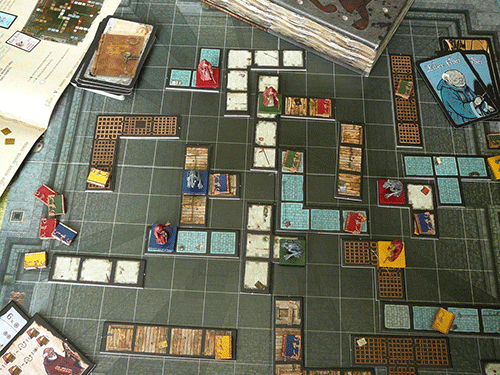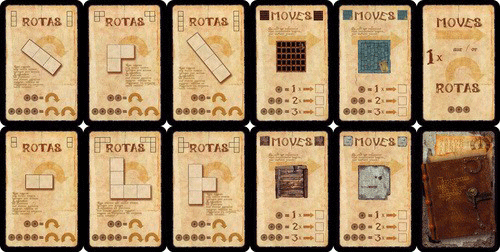Sator Arepo Tenet Opera Rotas Review
on Oct 12, 2016
If you have played a lot of games, done so over many years, and are jaded with the endless cavalcade of me-too Kickstarted designs then it can be hard to find anything fresh or novel. One of the things I have liked about all of the international titles that I have covered here for Review Corner is that each one has some feature or concept that it just a little more “fringe†than what you might expect from a big publisher like Asmodee. Sometimes these games are a little shaky, they aren’t always “the best†and often they seem destined to be novelties, not timeless classics. But for a few games, something like Sator Arepo Tenet Opera Rotas (SATOR) can be refreshing with its new perspectives and singular concepts.

By the time your turn comes around, this will all look completely different.
This particular title is a reprint of a 2008 release but this time, with its Malleus Maleficarium expansion in the box. I wanted to play this game when it was first released but never had a chance, now that I’ve had my hands on it I’m glad that I have played but it fits the above description of these international titles to the letter. It’s a little fringe, somewhat shaky, definitely not “the best†and it has a novelty to it that is really pretty compelling.
It’s fairly abstract despite a cool attempt at a unique setting. Each player controls a monk wandering a forbidden library that is sort of suspended over a pit with moving walkways that pivot and shift to make paths. They are all attempting to recover four lost books in their color and to do so, everyone must pay action points to play cards that correspond to either the Tetris-like shape or the material of a bridge tile. They both move and turn, and can do so with other players on them. Once a player has played cards to try to arrange the walkways to their liking, they spend action points equal to the number of cards to move.
It’s tricky stuff, which isn’t made any easier by all of the Latin on the cards. And it’s made positively diabolical by the player-driven chaos that can ensue when players are playing several cards a turn and completely re-arranging the pathways. Despite being abstract and really quite think-y, this is not a game for those who will be upset if their plans are completely borked before their turn comes back around. The chaos is fun, but it can unfortunately also lead to some downtime. It slows down when players try to sort out what they want to do with a board state that has changed one to three times since their last go.But when you do move your little resin monk onto one of his miniature books, it’s quite rewarding. You feel like you’ve outsmarted everyone, used your cards wisely and triumphed over the ever-changing maze the players create.

You’re hearing the music, aren’t you?
Truth be told, the first game I was very iffy on SATOR. It seemed terribly dry. But then one of my friends had an “aha†moment before everyone else and started using the cards to deliberately interfere with other players. Suddenly, the game opened up and became much more fun. And then, after trying it with the Malleus Maleficarium additions, there was no turning back.
Malleus Maleficarium chiefly adds a mutually controlled, wandering ghost-monk that can curse other players and affect their ability to play cards or spend points. It adds just a touch more nastiness to the mix, and I can definitely see that the designers of this game likely felt like it was a necessary add-on to enrich the more take-that tone of the game.
But that tone is really sort of at odds with the kind of game this is. It is closer to Wiz-War in some ways than a pure abstract, but it isn’t nearly as free-wheeling and aggressive. There’s a niche of fans in both camps that I think will like SATOR, but the question remains if this is one those that is often picked over in favor of better games. There again, there isn’t anything else quite like this and I think it’s a good choice for an off-the-beaten-path title.

 Customer Support
Customer Support  Subscribe
Subscribe 




 Account
Account  Wishlist
Wishlist 
